
Everyday at about
7:00 A.M., you can find me waiting for the bus that will take me to my job. I teach English at a Chinese university in
Beijing. I enjoy my work. It's challenging but not draining. It's fun and still rewarding. Let me tell you a little of what it's like to teach English as a foreigner in
China.
My Experience
China is a huge country. No one can visit a few places and claim to have experienced all of 'Chinese culture'. In reality China has many cultures. Each region and province is quite distinct from the others in how they live and operate. I have discovered that schools are the same way.
Each school offers a unique experience. If you hear someone's horror story about teaching in China, take it with a grain of salt. That horror story was one person's experience at one school in one part of China. The same advice holds true when you hear about another person's dream experience in the ideal situation. It's good not to use one person's impression to form your whole opinion of modern China.
While everyone has different experiences in China, I do consider my situation to be pretty typical of the basic life of a foreign English teacher in China. Reading my account will help you better understand what it is like to be here. But please keep in mind these experiences are only mine.
Finding a Job
China requires that all its students have a certain level of English to enter and graduate from college. As a result many, many schools are interested in using foreigners to give their students an advantage in English. So for a native English speaker, finding a teaching job in China is incredibly easy. A quick internet search will produce scores of schools looking for a foreigner to come and teach. That is what I did. Knowing I wanted to begin my life in China in the Beijing area, I searched for schools in Beijing that wanted foreign teachers. I found over sixty schools ranging from kindergartens to universities advertising for teachers, so I created a database of those schools.
The difficult part was sitting in America having no idea of what life in China was like while wondering which school I should choose. I read online that I might be able to come to China on a tourist visa and then switch to a working visa after I found a school. This seemed sensible to me as I would be able to check out a school firsthand before committing to a year-long contract. I applied for tourist visas for my wife and I.
The day I arrived in China, I sent out a mass email to all the schools in my database explaining my situation along with my resume. Within hours I began getting responses. Our method we ended up using was pretty simple: check out the schools that interested us, pray a lot, and make a decision. We were shown around several schools, looked at the living quarters, given offers and treated quite well. In the end we settled on a private middle school in the suburbs of Beijing where we taught our first year. Looking back, the whole process for us was, by grace, simple.
Private Schools vs. Public Schools
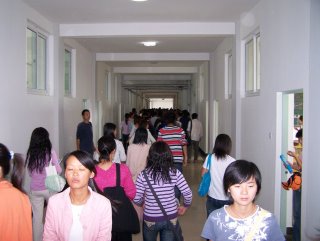 Every year 8 million high school graduates in China take the National College Entrance Examination. This huge number does not include the millions of young people (mainly countryside kids) who never finish high school for various reasons. Only half of those who actually take the exam will be eligible to enter even the lowest level of public colleges. Needless to say, this one test is extremely important and the source of tremendous anxiety and pressure for high school students.
Every year 8 million high school graduates in China take the National College Entrance Examination. This huge number does not include the millions of young people (mainly countryside kids) who never finish high school for various reasons. Only half of those who actually take the exam will be eligible to enter even the lowest level of public colleges. Needless to say, this one test is extremely important and the source of tremendous anxiety and pressure for high school students.
The result of the exam dictate the level of college a student can attend. About the top half of the participants are eligible to attend some form of public higher education. There are many levels of public universities and colleges. For the top few students, a bright future awaits them with opportunities to attend the best public universities in the nation. The lower a student scores the dimmer the prospects are of attending a reputable school. Stories abound of students who are admitted into better colleges because of bribes and relationship, but in reality the vast majority doesn’t have the right connections to attempt this. So the lower end of those eligible to attend college are only eligible only for smaller, less well-funded schools, which are administrated and funded by a city or maybe provincial level rather than on a national level.
For those who fail, the future is very grim. There is an option to go back to high school for another year and retake the exam, but that means paying a lot of money and enduring for a second time an unimaginably grueling senior year. Up until recently, the only other option was to enter the workforce in some menial vocation.
About ten years ago, a new phenomenon in modern China began--the private college. These institutions can offer certificates similar to diplomas, but they cannot give out actual degrees. Many are really vocational schools. For those students who failed to get into a reputable public school, these private schools offer at least some form of higher education. Obviously, the students in private colleges are more prone to having poorer study habits. They often are more interested in enjoying the new-found freedom of college life than in diligently studying.
Tuition fees vary widely, but typically they run about the same as public universities. Public schools are obviously non-profit and are also usually supported by public funds. Private schools are not. Their purpose is, of course, to make money. Inability to offer true degrees, desire for profit, low tuition rates, and low student academic levels all combine to insure that the quality of most private institutions remains inferior and their reputation remains lower than public institutions. However, private education is the best, if not the only, hope for many students who want to go to college but scored low on the college entrance exam.
The college I've taught in for the past two years is a private university, the Beijing University for Science and Technology. It attracts students from across China through an intense recruitment campaign, which mainly promotes its location in Beijing. Most Chinese have a deep-rooted idea that education in Beijing must be better than education outside of Beijing. So even if the school is private, at least students can say they are being educated in Beijing.
I teach in two departments of the college, the English Department and the International College. The English Department is quite large, and the tuition fee is pretty low. These students will have a foreign teacher only once a week for an hour and a half in a classroom with seventy other classmates.
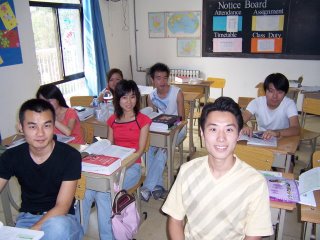 On the contrary, the International College is very small, only about 30 students in all. These students are divided into three classes. Their tuition is about five times more than the average program. More than half of the classes are taught by foreign teachers. The students in this program usually come from somewhat wealthier (or sometimes sacrificial) families, and they have dreams of going abroad after a couple of years.
On the contrary, the International College is very small, only about 30 students in all. These students are divided into three classes. Their tuition is about five times more than the average program. More than half of the classes are taught by foreign teachers. The students in this program usually come from somewhat wealthier (or sometimes sacrificial) families, and they have dreams of going abroad after a couple of years.
When choosing to teach in a private school, I was obviously choosing not to teach the cream of China's scholastic crop. I went in with my eyes open. I chose a private school for several reasons. First, the boss at my school had a good reputation for working with foreigners. Second, private schools generally pay higher. Third, the school, students, and parents know the level of the student, so less is expected, and therefore fourthly, progress is more appreciated than might otherwise be the case. Lastly, at this point in my third year at this college, I'm used to it. I know what's expected, and they seem to like what I offer.
The Campus
The Beijing University for Science & Technology, or Bei Ke, is located in a small, dirty town located between central Beijing and Chang Ping, where I live. Each morning I leave my apartment, and walk to a bus stop down the street. After a twenty-five minute ride, I get off in Sha He, an industrial town full of bustle, dust, and grime. It still has the feel of being an old style town, kind of like a town in the old Wild West. People there have absolutely no qualms with publicly throwing their wrappers, bottles, and trash into the street.
Getting off the bus, I hut down a three-wheeled taxi to take me to the college. For five grueling minutes this motorized bike putters along realigning my back with each bump. We pass a railroad yard, cross train tracks, then several factories all while dodging cars and trucks that are flying by. Finally, we swing left onto the road that leads to the college. Handing the driver his two yuan ($0.25), I head to the front gate.
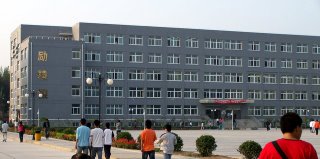 The college is a mixture of old and new. A few years ago, the college was started by converting old factory buildings into a college. Recently, the college has been expanding like crazy, building at least six large buildings since I've arrived. When I arrive in the mornings the place is usually already swarming with students heading to their classes.
The college is a mixture of old and new. A few years ago, the college was started by converting old factory buildings into a college. Recently, the college has been expanding like crazy, building at least six large buildings since I've arrived. When I arrive in the mornings the place is usually already swarming with students heading to their classes.
The classrooms are very basic. Sometimes they are lacking in cleanliness. Decoration, which should be designed by the students, is usually sparse. In America students usually go from classroom to classroom for their different classes. At Bei Ke, the students stay in the same classroom for all their classes while the teachers rotate.
I have a little office, which I shared last year with one other foreign teacher. This year there are seven of us using it! It has two desks, a computer, a fan, and some chairs and stools. Fortunately, when I need to use the office, there aren't too many others who need it at the same time.
Like most places in China the bathrooms leave much to be desired. The usual smells are horrendous. However, at Bei Ke students are officially not supposed to smoke, yet most of the boys do. So they often use the toilet as their safe haven to indulge. This brew of odors makes the restroom a rushroom--quick in, quick out. The commodes are typical Asian squatty-potties rather than western style, and they take some getting used to. All in all, I don't frequent these facilities anymore than I absolutely have to.
Housing
Every full-time foreign teacher has the option of living in an on-campus apartment. During our first year in the school, we stayed in one. Having heard quite a few stories of awful living conditions in other schools, we were pleasantly surprised to find that our six-floor building was newer and therefore clean. Our apartment contained a spacious bedroom, small living room, small kitchen, and small bathroom. It was air-conditioned, had a western toilet, and never leaked. While we lived on campus, the school never charged us for electricity or water. Once the internet connection became ridiculously slow, the fee for that was also waived. So we had it quite good.
For some mysterious reason, our school refused to allow us to live below the sixth floor. Lacking an elevator, this made life a little interesting especially since we had a one-year-old son to carry up and down. For the first seven months, the washer was on the first floor. So my precious wife made trip after trip lugging laundry and our one-year-old up and down those stairs. After she became pregnant with our second child, the school graciously bought her a washer for our apartment! That helped a lot. Though the walking kept me in shape, I never quite learned how to enjoy the jog up. I do know this: there were 102 steps from top to bottom.
After a year of living on campus, we were able to rent an apartment in the Beijing suburb of Chang Ping about an hour by bus from Beijing and forty minutes from my school. Though we like our new arrangement much better, we will always have wonderful memories of our time in our little campus apartment.
The Students
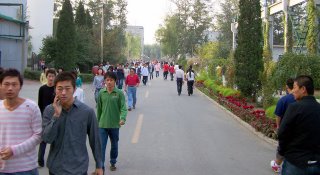 Being over six feet tall and white in China, I do get quite a reaction from students when they first see me on campus. Unaware that I speak a little Chinese, students will usually freely comment about their opinions of me and my height. At the beginning of each new academic year, I feel like a minor celebrity on campus. Before long, the students get used to me, and shrieks and giggles turn into polite smiles and greetings.
Being over six feet tall and white in China, I do get quite a reaction from students when they first see me on campus. Unaware that I speak a little Chinese, students will usually freely comment about their opinions of me and my height. At the beginning of each new academic year, I feel like a minor celebrity on campus. Before long, the students get used to me, and shrieks and giggles turn into polite smiles and greetings.
Being American has been quite an advantage for me. Being from California gives me even more clout. I've met other foreign teachers who will even lie about their origins to get the extra respect, so I feel very fortunate to be able to claim such popular places as my origin.
The students respect me from the start because I'm the 'foreign teacher.' However, maintaining that respect is the hard part. It requires teaching good lessons and genuinely trying to do my best. The students are normal people, and when they sense I'm doing my best, they seem to respond with giving theirs (at least while I'm with them). Teaching a good class with students obviously paying attention and enjoying the material taught is very rewarding.
I'm not in China to teach English. I teach English so I can be in China. However, I enjoy teaching more than ever. Though I still have a long way to go, I can honestly say I've gotten better at it. I am constantly looking for and implementing new ideas. For as long as I'm teaching English, I want to continue becoming a better teacher. When I've 'arrived', I'll let you know.
My Week
Being a private school, Bei Ke wants to get good teachers from public schools. To accomplish this, my school has classes Wednesday through Sunday. The goal is to attract teachers from public schools to earn extra money teaching part time on their weekends. Mondays and Tuesdays are supposed to be my 'weekend.'
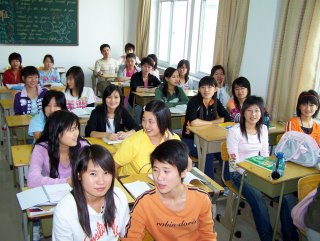 At the time I signed my first contract with the school, we were attending Beijing Baptist Church every Sunday. I informed Bei Ke that Sunday was my day of worship, so they gave me a contract to work Wednesday through Saturday. Basically, I've been blessed with a three day weekend every week!
At the time I signed my first contract with the school, we were attending Beijing Baptist Church every Sunday. I informed Bei Ke that Sunday was my day of worship, so they gave me a contract to work Wednesday through Saturday. Basically, I've been blessed with a three day weekend every week!
I'm contracted to teach twenty class periods of forty-five minutes each. However each class is actually an hour and a half long, so I teach 10 of these classes per week. Wednesday and Friday, I teach two classes in the morning (8:00-9:30 & 10:00-11:30) and one in the afternoon (2:10-3:40). Thursday, I have one class in the morning and one in the afternoon. Saturday has two classes in the morning. Once my classes are finished for the day, I'm free to go.
Wednesdays, Thursdays, and Fridays, I have several hours between morning and afternoon classes. Wednesday's time is used for study and prayer. Thursdays are 'date days.' I take my wife out to lunch. I love Thursdays. Fridays, I usually have lunch with the other foreign teachers to catch up with their lives and find out any important information nobody bothered to tell like class changes and so forth. This is followed by another long session of study in the office.
Once my last class is finished, I enjoy a feeling of accomplishment as I walk off campus to a catch a three-wheeled taxi. This takes me to Sha He's main bus stop where I wait (sometimes patiently) to catch the orange 21 bus to Chang Ping. Twenty-five minutes later, I get off the bus, take a short walk, ride the elevator to the ninth floor, and open my door to the wonderful comfort and joy of wife, children, and home.

 Everyday at about
Everyday at about  Every year 8 million high school graduates in
Every year 8 million high school graduates in  On the contrary, the
On the contrary, the  The college is a mixture of old and new. A few years ago, the college was started by converting old factory buildings into a college. Recently, the college has been expanding like crazy, building at least six large buildings since I've arrived. When I arrive in the mornings the place is usually already swarming with students heading to their classes.
The college is a mixture of old and new. A few years ago, the college was started by converting old factory buildings into a college. Recently, the college has been expanding like crazy, building at least six large buildings since I've arrived. When I arrive in the mornings the place is usually already swarming with students heading to their classes.
 At the time I signed my first contract with the school, we were attending
At the time I signed my first contract with the school, we were attending 


1 Comments:
You guys make China look so pretty and alot of fun. I hope I'm able to visit someday.
Post a Comment
<< Home